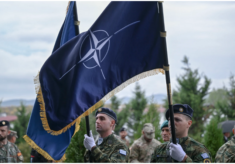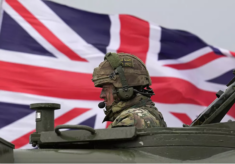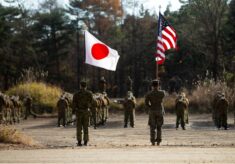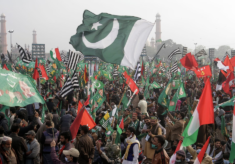After 10 months from the new US President Trump in office, the lack of a clear foreign policy in the new US Administration, with the exception of sparkling statements and tweets on the revision of the entire legacy received from the previous Administrations, has scrambled cards in the Middle East. In all the countries that have a say in, or claim to have it as regional leaders (Turkey, Iran, Saudi Arabia) and in those countries where after the Arab Springs it is about to rebuild the State structures and resettling geopolitic, we see a shift of interests towards Russia (Turkey, Iraq, Egypt, Libya, Kurdistan) or a confirmation of the on-going relations (Syria, Iran) but all of them have a greater consideration for Russia for the role already played, or that could be performed in the Region (Israel, Saudi Arabia).
For most of them, this is not an anti-American shift. Alliances, military interests, economic ties and friendship (Israel, Saudi Arabia, Egypt and even Turkey) are all in place. But the Russians claims that US policy in the region has caused many wars, much terrorism and few peace (Cui prodest?), and has not stabilized and increased the revenues of the main resource of some of these countries, oil, on the contrary, it has damaged them. Therefore it is time to make new alliances, even with the old enemies to be prepared for the end of the Syrian war, redraw Iraq and if necessary launch new destabilization campaigns (Lebanon and Yemen and more).
As far as the fight against terrorism and the liquidation of the Islamic State is concerned, it is now common ground that Russia has contributed to this goal in two years of presence in the region much more than the US in the decade ahead. Better did the Americans with the “regime change” policy. They had the desired effect, in the sense that many regimes fell, not all, but the consequences were less manageable by throwing many countries into the civil war between political factions, ethnic and tribal groups, and religious beliefs. In all these scenarios, Russia was absent before and now is present. This is also a merit or a demerit of the American politics.
Briefly by some of the countries involved in the new Russian design for the Middle East.
Iran: The threat of a revision of the Nuclear Deal or its cancellation and hence the reinstatement of economic sanctions against Iran (Europe is against it) actually stimulates Teheran’s ambitions and threatens relations with European allies. Teheran is currently only interested in a portion of Shi’a Iraq, supports Assad’s Syrian Shiite government, and foresees with Hezbollah to play a role in the Lebanese crisis. Stimulating Saudi Arabia and Israel against Tehran at this stage, as well as bringing civil war back to Lebanon, and therefore inviting Russia to enter this scenario, reopens the long and painful nuclear arms race dossier.
For some countries with a strongly anti-American ideology, as North Korea, this is a very useful issue in both domestic policy and national security, as well as in foreign policy, as it enhances the country’s influence and threat. To threaten a country that threatens, in fact, causes the external threat to justify their position as an effect. The slightest result is that Tehran finds vent in the regional sphere. On the contrary, having Teheran at the negotiation table gives more room to control the developments.
Turkey: Relations between US and Turkey have deteriorated heavily, and while Turkey is keeping its status of prominent NATO member, its government has undertaken after the failed takeover a hard repression of the oppositions. Ankara talks better with Moscow than with Washington. Being engaged on internal issues, it’s obliged to resize regional ambitions. At the moment Erdogan is committed not to lose power in Turkey. He wants to leave the Syrian crisis and war that he initially supported against Assad, including terrorists, until the Russian intervention, without the creation of a state of Kurdistan (15 million Kurds live in Turkish territory).
As the Palestinian cause, the creation of a Kurdish State is not seen at present as a stabilization element in the region unless it is limited to Syrian-Iraqi Kurdistan, supposedly supported by Russia. Russia’s potential support to the Kurdish cause and the threat of a Great Kurdistan, along with Russian gas transport to Europe via Turkey, were among the main arguments to convince Erdogan to come closer to Russia.
Lebanon: the recent controversy about Prime Minister Saad Al Hariri, saw Saudi Arabia’s involvement and is part of what has been called Iran-Saudi Arabia proxy war. This involved also the long-term allies of the two opponents, Russia for Iran and the United States for Saudi Arabia. In Lebanon, Teheran backs Hezbollah who has carried out an endless series of attacks, including in 2005 killing Saad’s father, Rafik Al Hariri, also a former Saudi Lebanese Prime Minister of Lebanon. This attack stimulated the beginning of the Cedar Revolution that led, among other things, to democratic elections and at the end of Syrian presence and influence in Lebanon.
The interest of Saudi Arabia in “capturing” or “protecting” Saad Al Hariri, his forced resignation, the alleged death threats by Hezbollah (that continues to gain political leverage and consensus in Lebanon), and the war winds between Saudi Arabia and Iran, would suggest a repetition of this scheme. This time provoking a new civil war in Lebanon, expecting to define Hezbollah’s eradication from Lebanon’s policy and therefore Iranian influence.
This pattern would be welcomed by Israel, but in this case, Russia’s position would be decisive. Russia is allied with Iran and Hezbollah in Syria and Lebanon, and Israel is already intensifying its deterrent attacks against Hezbollah and government forces. Russia certainly will not be able to sustain a weakening of its ally although obviously cannot go to war directly in Lebanon. In these days the Lebanese Foreign Minister has visited rapidly Moscow after the PM resignations in his country, asking for a wider role and involvement of Russia in the Lebanese crisis.
Israel: As government forces in Syria, with Russia, Iran, and Hezbollah support re-regained control of significant portions of the territory, Israel needs a new clash with Hezbollah to secure north borders and territories, as well as the occupied zone of the Golan Heights. The Saudi plan to destabilize Lebanon, therefore, is for Israel of particular interest.
If aggressive fighting between Israel and Hezbollah runs counter Russia’s interests, Moscow will be well positioned to restrict the freedom of action of both sides and helping to settle the conflict. The Kremlin would probably exploit such a war to improve its position and influence on the wider Middle East.
Russia cannot permit Israel to dismiss its Hezbollah ally, but Russia dislikes Hezbollah and Iran increasing of their ambitions in defining the Syrian future. This would undermine the consolidated success on the field by the Russian campaign. But a Hezbollah-Israel containment war would be convenient for both parties. At this stage, Russia is concerned that its allies Iran and Hezbollah are not too weak but not too strong.
Saudi Arabia is the most dramatic, dynamic, and more visible case of the moment.
A history of the United States, rich and stable until recently, has found that it has both budget problems, succession to the throne, weakened role in the region and low international acceptance, both internal discord and outside enemies in Yemen, Iran and Israel, more active and effective.
The historic visit of Saudi King Salman Al Saud to Moscow has opened a new line of interests with Russia. Military supplies, economic exchanges and intense diplomatic political consultations in recognition of the new role played by Russia after the intervention in Syria and in the hope of counterbalancing Moscow’s support in the region over Iran.
For the Russians, it was a very important event. The first state visit since the two nations embarked on diplomatic relations in 1924. Accompanied by a delegation of more than 1000 people, it had a media impact in the country of great importance.
Kremlin welcoming has been organized by the Protocol with the utmost attention and with the utmost brilliance to show that even the Tsars of Russia can afford much gold and marbles and artworks in sumptuous palaces.
After negotiations between President Vladimir Putin and King of Saudi Arabia Salman Al Saud, the agreement was reached on the purchase of S-400 Triumph anti-aircraft missile systems by Riyadh. Also, the parties signed a contract for the organization of production in Saudi Arabia of Kalashnikov assault rifles, and also signed a memorandum on the purchase and localization of heavy flame-throwing systems TOS-1A, anti-tank missile systems “Kornet-EM” and grenade launchers AGS-30.
For the budget of the crown, the oil price fall imposed by Saudi Arabia has in fact damaged the Kingdom itself, and for the first time, it had to manage a budget deficit: 15% in 2015, 17.5 in 2016. Budget is improving only this year thanks to the agreement with Russia on the limitation of production quotas.
On the regional side, having lost the war in Syria sees in Lebanon a new front to counter Hezbollah and Iran. New alliances are therefore needed. Approaching Russia with contracts and consultations and Israel as an ally against Hezbollah meets these requirements.
Roberto d’Agostino – Executive and Italian Honorary Diplomat based in Russia, expert in Government Relations and Russia’s domestic and international affairs. Graduated in Oriental Studies in Italy, he specialised in Middle East and Soviet Studies in Cairo, Moscow and New York





























